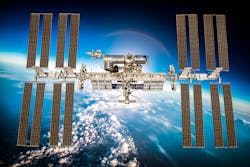Johns Hopkins Medicine researchers are collaborating with NASA to send human heart “tissue-on-a-chip” specimens into space as early as March. The project is designed to monitor the tissue for changes in heart muscle cells’ mitochondria (their power supply) and ability to contract in low-gravity conditions.
The tissue samples will be launched into space aboard SpaceX CRS-27, a resupply mission to the International Space Station, slated for liftoff no earlier than Tuesday, March 14, at NASA’s Kennedy Space Center in Florida.
Astronauts on board during the mission will also introduce three FDA-approved medicines to the samples in efforts to prevent heart cell changes known or suspected to occur in those undertaking long-duration spaceflights.
To develop the microengineered human heart tissue-on-a-chip, researchers begin with human induced pluripotent stem cells grown in the laboratory. Such cells are able to develop into nearly any type of cell, and are coaxed biologically to develop into beating human cardiomyocytes, the muscle cells that make hearts contract.
Groups of cardiomyocytes form tissue that can be strung between two posts, one flexible and one stiff. The flexible post has an embedded magnet and, when placed over sensors, allows for collection of information on tissue contraction. The chamber enclosing the tissue is sealed so that liquid media feeding the tissue doesn’t float away in space. These tissue chambers are then loaded into so-called plate habitats with the magnetic sensors located beneath the tissue. The experimental payload consists of two of these plate habitats, which measure about 7 inches long, 5 inches tall and 4 inches wide.

